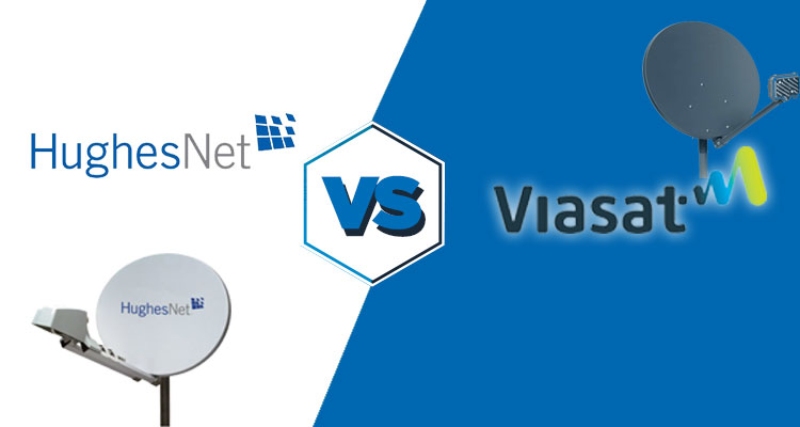Tech
HughesNet vs. Viasat: The Battle Between Satellite Internet Giants

In the digital age, it can be challenging to have no access to reliable internet. Aside from missing the convenience, the internet provides whenever you need to search for something, it also delivers various opportunities for many people. If you live in a rural or underserved area, you completely understand the struggle of finding a fast, stable internet connection. Fortunately, even if fiber or cable internet isn’t available in your area, you can expect satellite internet to be there for you when you need it most.
In the United States, there are two satellite internet providers that have been in a long battle for quite some time—Viasat and HughesNet. In this article, we’re going to discuss both companies, their plans, and pricing, as well as their pros and cons, so you can decide which one is the best fit for your needs.
HughesNet vs. Viasat: A Quick Comparison
We all know that choosing an internet provider that can provide for our specific needs can be challenging. Whether you’re aiming for more affordable internet plans with decent speeds or you don’t mind paying extra to get the highest internet speed available, it’s important to compare your choices.
In this HughesNet vs. Viasat battle, we’ve prepared a simple chart to let you see their significant differences and help you choose the provider that best fits your needs.
| HughesNet | Viasat | |
| Maximum Download Speeds | 25Mbps | 150Mbps |
| Maximum Upload Speeds | 3 Mbps | 3 Mbps |
| Data Allowance | 15 to 100GB | 40 to 300GB |
| Cheapest Internet Plan | $45 | $65 |
| Equipment Costs | $15/$450 one-time purchase | $13/$299 one-time purchase |
| Contract Agreement | Two years | Two years |
HughesNet
Compared to other satellite internet providers, HughesNet is recognized for offering consistent speeds and slightly lower prices. Broadband internet requires a minimum download speed of 25 Mbps and an upload speed of 3 Mbps, and HughesNet satellite internet precisely meets these requirements. All HughesNet internet packages have the same download and upload speeds, but with different data allowances.
The monthly data allocations for HughesNet are 15GB to 100GB, which is a little less than Viasat’s data allowance. You do have the choice, though, to add as much data as you require for the entire month. Additionally, all of their plans are unlimited, so you can stop worrying about paying extra charges if you go over your monthly limit. Unfortunately, if you decide not to pay for additional data, you will have to deal with much slower speeds.
HughesNet Internet Plans & Pricing
| Plan | Maximum Download Speeds | Maximum Upload Speeds | Promo Monthly Cost | Regular Monthly Cost | Data Allocation | Terms | Equipment Fees |
| Gen 5 | 25Mbps | 3Mbps | $45/mo. | $65/mo. | 15GB | 24 Mos. | $15/mo. Or $450 one-time purchase |
| Gen 5 | 25Mbps | 3Mbps | $55/mo. | $75/mo. | 30GB | 24 Mos. | $15/mo. Or $450 one-time purchase |
| Gen 5 | 25Mbps | 3Mbps | $90/mo. | $110/mo. | 45GB | 24 Mos. | $15/mo. Or $450 one-time purchase |
| Gen 5 | 25Mbps | 3Mbps | $140/mo. | $160/mo. | 75GB | 24 Mos. | $15/mo. Or $450 one-time purchase |
Viasat
HughesNet is generally less expensive than Viasat, but Viasat’s satellite internet plans offer higher data allocations. Viasat offers data allowances between 40GB and 150GB with speeds up to 12Mbps, 25Mbps, 50Mbps, and 100Mbps. You might even experience a faster internet speed in some areas than in others.
If you’ve signed up for a high-data and high-speed internet plan, you should specifically keep an eye out for a price increase after three months. So, if you don’t mind paying extra for higher data allocations, Viasat may be the internet provider for you. However, the majority of Viasat’s internet packages have a two-year contract that locks you into making expensive payments of up to $100 a month for the following 21 months.
Viasat Internet Plans & Pricing
| Plan | Maximum Download Speeds | Maximum Upload Speeds | Promo Monthly Cost | Regular Monthly Cost | Data Allocation | Terms | Equipment Fees |
| Unlimited Bronze 12 | 12Mbps | 3Mbps | $70/mo. | $100/mo. | 40GB | 24 Mos. | $13/mo. Or $299 one-time purchase |
| Unlimited Silver 25 | 25Mbps | 3Mbps | $100/mo. | $150/mo. | 60GB | 24 Mos. | $13/mo. Or $299 one-time purchase |
| Unlimited Gold 50 | 50Mbps | 3Mbps | $150/mo. | $200/mo. | 100GB | 24 Mos. | $13/mo. Or $299 one-time purchase |
| Unlimited Platinum 100 | 100Mbps | 3Mbps | $140/mo. | $300/mo. | 150GB | 24 Mos. | $13/mo. Or $299 one-time purchase |
Conclusion
So, who wins the HughesNet vs. Viasat battle? Honestly, it depends on what you’re looking for in an internet service provider. If you want a low-cost yet reliable satellite internet connection with consistent speeds, then HughesNet is the better choice. However, if you don’t mind paying a little extra for higher data allowances, then Viasat may be a better option for you.
-

 Business4 weeks ago
Business4 weeks agoHow to fill MSME Form 1? Step-by-Step Guide
-
Business4 weeks ago
From Marine to Chief: The Leadership Journey of Sean Mannix
-

 Gadget4 weeks ago
Gadget4 weeks agoAfter Grand Success on BLDC Ceiling Fan, Eff4 Is Launching Smart Bulb
-

 Festivals & Events4 weeks ago
Festivals & Events4 weeks agoGoogle Celebrates Cherry Blossom Season with Animated Doodle
-

 Business2 weeks ago
Business2 weeks agoPrakash and Kamal Hinduja: Driving Social and Environmental Change
-
Education3 weeks ago
Fred DuVal: University Leadership as a Critical Resource for Climate Change Research and Life-Saving Solutions
-

 Sports4 weeks ago
Sports4 weeks ago2025 NASCAR Craftsman Truck Series Baptist Health 200 at Homestead-Miami Speedway: Race Preview, Prediction, Schedule, Entry List, Drivers to Watch and How to Watch
-

 Health2 weeks ago
Health2 weeks agoThe Hinduja Brothers Commitment to Global Health: Empowering Communities Across Borders













